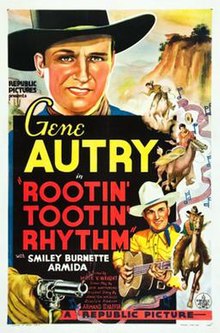
Lester Alvin Burnett, better known as Smiley Burnette, was an American country music performer and a comedic actor in Western films and on radio and TV, playing sidekick to Gene Autry, Roy Rogers, and other B-movie cowboys. He was also a prolific singer-songwriter who is reported to have played proficiently over 100 musical instruments, sometimes more than one simultaneously. His career, beginning in 1934, spanned four decades, including a regular role on CBS-TV's Petticoat Junction in the 1960s.
Henry Alfred Clauser (1911–1989) was a guitarist, songwriter and engineer featured on radio shows in Des Moines, Iowa and Tulsa, Oklahoma.
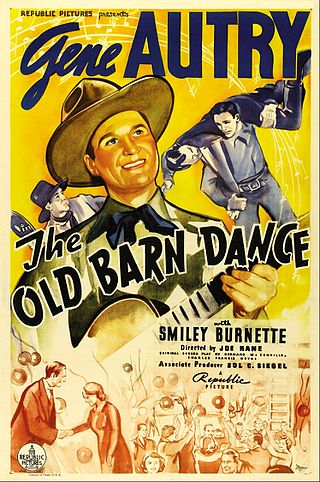
The Old Barn Dance is a 1938 American Western film directed by Joseph Kane and starring Gene Autry, Smiley Burnette, Joan Valerie, and written by Bernard McConville and Charles F. Royal.

Springtime in the Rockies is a 1937 American Western film directed by Joseph Kane and starring Gene Autry, Smiley Burnette, and Polly Rowles. Written by Gilbert Wright and Betty Burbridge, the film is about a ranch owner who brings a flock of sheep into cattle country and faces the opposition of local ranchers with the help of her ranch foreman.

Public Cowboy No. 1 is a 1937 American Western film directed by Joseph Kane and starring Gene Autry, Smiley Burnette, and Ann Rutherford. Based on a story by Bernard McConville, the film is about a singing cowboy who chases down rustlers who are using airplanes, shortwave radios, and refrigerated trucks to steal cattle.
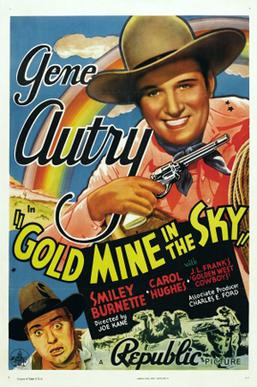
Gold Mine in the Sky is a 1938 Western film directed by Joseph Kane and starring Gene Autry, Smiley Burnette, and Carol Hughes. Based on a story by Betty Burbridge, the film is about a singing cowboy and ranch foreman who, as executor of the owner's will, must see that the daughter and heiress does not marry without his approval.
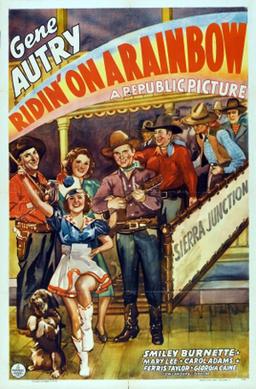
Ridin' on a Rainbow is a 1941 American western musical film directed by Lew Landers and starring Gene Autry, Smiley Burnette and Mary Lee. Written by Bradford Ropes and Doris Malloy, based on a story by Ropes, the film is about a singing cowboy whose investigation of a bank robbery takes him to a showboat, where he finds that a teenage singer's father has been working with the robbers to provide for her future. The film received an Academy Award nomination for best original song for "Be Honest with Me".
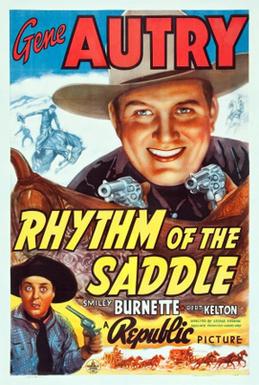
Rhythm of the Saddle is a 1938 American Western film directed by George Sherman and starring Gene Autry, Smiley Burnette, and Pert Kelton. Written by Paul Franklin, the film is about the foreman at a ranch owned by a wealthy rodeo owner who will lose her rodeo contract unless sales improve.

Melody Trail is a 1935 American Western film directed by Joseph Kane and starring Gene Autry, Ann Rutherford, and Smiley Burnette. Written by Sherman L. Lowe and Betty Burbridge, the film is about a singing cowboy who goes after the men who kidnapped the baby he should have been babysitting. The film features the songs "On the Melody Trail", "A Lone Cowboy on the Lone Prairie", and "Western Lullaby".
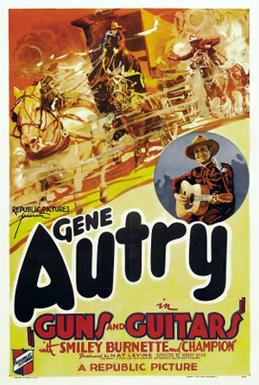
Guns and Guitars is a 1936 American Western film directed by Joseph Kane and starring Gene Autry, Smiley Burnette, and Dorothy Dix in her final film appearance. Written by Dorrell and Stuart E. McGowan, the film is about a singing cowboy who helps protect a county from fever-ridden cattle, and after being framed for murdering the sheriff, proves his innocence, gets elected sheriff, and then goes after the bad guy.
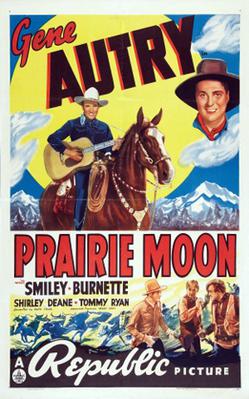
Prairie Moon is a 1938 American Western film directed by Ralph Staub and starring Gene Autry, Smiley Burnette, and Shirley Deane. Written by Betty Burbridge and Stanley Roberts, the film is about a singing cowboy who takes care of three tough boys sent west from Chicago after their father dies and leaves them a cattle ranch.

Western Jamboree is a 1938 American Western musical film directed by Ralph Staub and starring Gene Autry, Smiley Burnette, and Jean Rouverol. Based on a story by Patricia Harper, the film is about a singing cowboy who goes up against a gang of outlaws who are looking to steal the valuable helium gas beneath the cowboy's ranch.

Mountain Rhythm is a 1939 American Western film directed by B. Reeves Eason and starring Gene Autry, Smiley Burnette, and June Storey. Based on a story by Connie Lee, the film is about a cowboy who organizes his fellow ranchers to oppose an Eastern promoter's land grab scheme.

Rovin' Tumbleweeds is a 1939 American Western film directed by George Sherman and starring Gene Autry, Smiley Burnette and Mary Carlisle. Written by Betty Burbridge, Dorrell McGowan, and Stuart E. McGowan, the film is about a cowboy congressman who exposes a crooked politician who is delaying passage of a flood control bill.
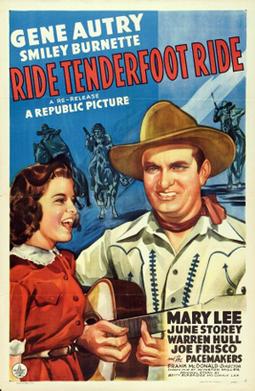
Ride, Tenderfoot, Ride is a 1940 American Western film directed by Frank McDonald and starring Gene Autry, Smiley Burnette, and June Storey. Written by Winston Miller, based on a story by Betty Burbridge and Connie Lee, the film is about a singing cowboy who inherits a meat-packing plant and must face stiff competition from a beautiful business rival.
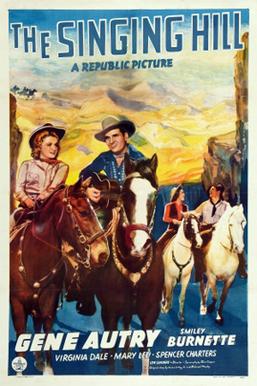
The Singing Hill is a 1941 American western film directed by Lew Landers and starring Gene Autry, Smiley Burnette, and Virginia Dale. Based on a story by Jesse Lasky Jr. and Richard Murphy, the film is about a singing cowboy and foreman of a ranch that may be sold to an unscrupulous banker by the young madcap heiress who is unaware that the sale will result in the local ranchers losing their free grazing land and their ranches. In the film, Autry performed the 1940 song "Blueberry Hill", first recorded by Sammy Kaye, which would become a standard recorded by such artists as Louis Armstrong (1949), Fats Domino (1956), and Elvis Presley (1957). The song became one of Autry's best-selling recordings. In 1987, "Blueberry Hill" received an ASCAP Award for Most Performed Feature Film Standards on TV.

Back in the Saddle is a 1941 American Western film directed by Lew Landers and starring Gene Autry, Smiley Burnette, and Mary Lee. Written by Richard Murphy and Jesse Lasky Jr., the film is about a singing cowboy who attempts to bring peace between ranchers and the operator of a copper mine whose chemicals are poisoning the area's water supply. The film features several of Autry's hit songs, including "Back in the Saddle Again", "I'm An Old Cowhand", and "You Are My Sunshine".
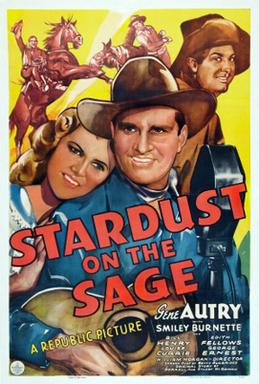
Stardust on the Sage is a 1942 American Western film directed by William Morgan and starring Gene Autry, Smiley Burnette, William Henry, and Edith Fellows. Written by Betty Burbridge, based on a story by Dorrell and Stuart E. McGowan, the film is about a singing cowboy who helps his fellow ranchers against a corrupt mine superintendent looking to steal the mine in which they've invested. The film soundtrack features two duets by Autry and Fellows, "When the Roses Bloom Again" and "I'll Never Let You Go, Little Darlin'". The final scene includes an innovative audience sing-along medley of the classics "You Are My Sunshine", "Home on the Range", and "Deep in the Heart of Texas", with Burnette conducting and the words appearing at the bottom of the screen.

Call of the Canyon is a 1942 American Western film directed by Joseph Santley and starring Gene Autry, Smiley Burnette, the Sons of the Pioneers, and Ruth Terry. Based on a story by Maurice Rapf and Olive Cooper, the film is about a singing cowboy who leads a group of cattlemen against the corrupt agent of a large packing company looking to swindle them by undercutting the buying price for beef. The film features three songs by Autry and the Sons of the Pioneers, including the classic "Take Me Back to My Boots and Saddle".

Heart of the Rio Grande is a 1942 American Western film directed by William Morgan and starring Gene Autry, Smiley Burnette, Fay McKenzie, and Edith Fellows. Based on a story by Newlin B. Wildes, the film is about a singing cowboy and dude ranch foreman who helps a spoiled teenager and her business tycoon father discover what is most important in life. The film features the songs "Let Me Ride Down in Rocky Canyon", "Deep in the Heart of Texas", "Dusk on the Painted Desert", and "Rainbow In the Night" performed by Edith Fellows.
